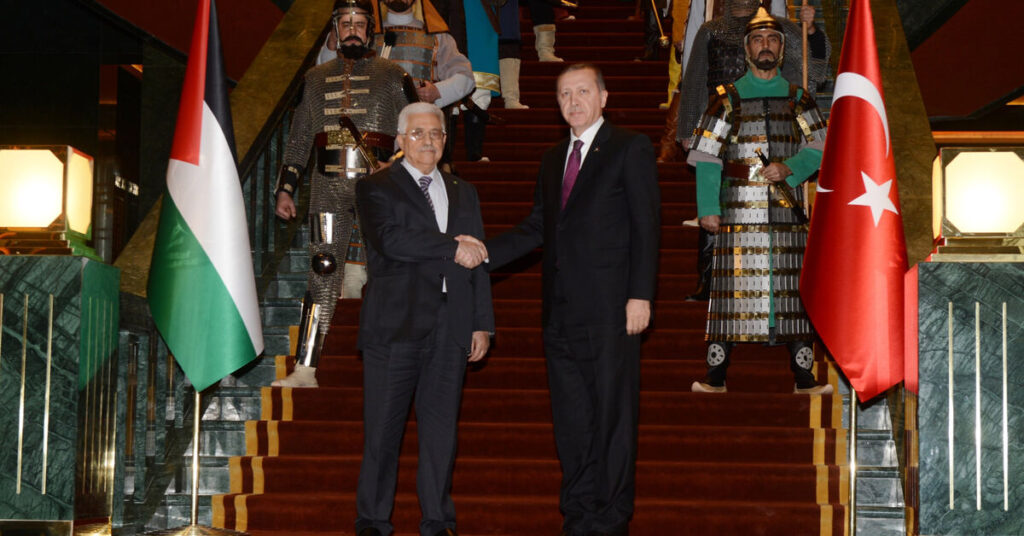ANKARA — Turkish President Recep Tayyip Erdogan hosted Palestinian President Mahmoud Abbas on Tuesday and stressed the need for Palestinian unity.
“Ensuring unity and solidarity among the Palestinian people will be the best response to Israeli repression,” Erdogan said at a joint press conference with Abbas after their one-on-one meeting in Ankara last week that lasted about an hour.
Abbas, who is on a three-day visit to Turkey at Erdogan’s invitation, vowed to make “every effort” to achieve Palestinian unity for the first time since the start of the war between Hamas and Israel.
“We will unite Palestine and the Palestinians by fulfilling our international obligations under our political program,” he said through a translator.
Abbas also called for an international conference to draft a “road map” on which to base the recognition of a Palestinian state. “European countries, in particular, must recognize Palestine,” he added.
Abbas’s visit comes as the U.S. works to reform the Ramallah-based Palestinian Authority (PA), which U.S. Secretary of State Antony Blinken said in January would “effectively take responsibility for the Gaza Strip” if a ceasefire is achieved. “Gaza and the West Bank will then be reunited under Palestinian leadership,” Blinken said during his last visit to the region in January.
The Palestinian Authority, led by Prime Minister Mohammad Shtayyeh, reportedly resigned last week to pave the way for a technocratic government acceptable to both Fatah and Hamas.
President Erdogan reiterated his country’s previous position on the Israeli-Palestinian conflict and urged a two-state solution. “The international community’s futile efforts to manage the consequences of the ongoing occupation, instead of a two-state solution, are a meaningless and futile approach,” he said. “All parties involved need to take responsibility to ensure a two-state solution.”
He added that Turkey was ready to play the role of guarantor on behalf of Palestine in any future peace process as both leaders have voiced opposition to any expulsion of Palestinians from their land.
Analysts believe the two sides likely held private discussions about post-ceasefire efforts in Gaza.
“One possible way would be to form a Palestinian Authority that encompasses all of the Palestinian political movements,” said Selim Sezer, an assistant professor of international relations at Istanbul Gedik University who follows the conflict closely. “If that’s not possible, I think Turkey is more likely to support the idea of a technocratic government,” he added.
Another issue they discussed, Sezer said, was the delivery of humanitarian aid to the Gaza Strip, where at least 10 children have died from “severe malnutrition,” according to the World Health Organization.
Turkish Foreign Minister Hakan Fidan suggested on Sunday that Turkey may be trying to persuade Egypt to send aid to the Palestinian territories through the Rafah crossing without Israeli permission.
While Erdogan did not defend any unilateral action on aid, Fidan stepped up his demands on Tuesday. “There is an overwhelming expectation that we take action now, even if it is a unilateral action,” Fidan said in a speech to an extraordinary meeting of the Organization of Islamic Cooperation foreign ministers in Jeddah.
Sezer recalled that Egypt had previously coordinated with Israel on entry and exit through the Rafah crossing based on a security agreement signed between the two countries. “What is being discussed now is a new arrangement that will allow aid trucks to enter Gaza only with the permission and approval of Egyptian authorities, without Israeli authorization,” he said.
But it seems unlikely that Egypt would give the green light to such an effort, according to Mehmet Lakipoglu, an adjunct researcher at the London-based Dimensions for Strategic Studies. “We are talking about Egypt and the Egyptian army, which has not had any security issues with Israel since the two countries normalized relations in the past,” he told Al-Monitor. “There does not seem to be any impetus to make Egypt approve such measures.”


